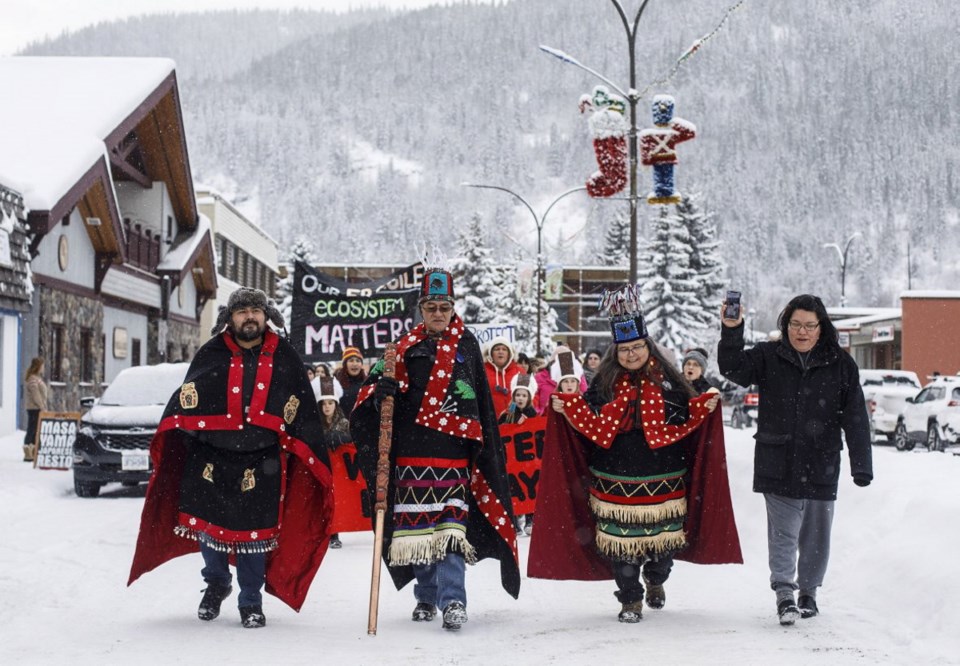VANCOUVER — The Wet’suwet’en hereditary clan chiefs and their supporters want a public investigation into the way the RCMP are controlling access along a rural road in northern B.C.
The RCMP have said they set up a checkpoint along the Morice West Forest Service Road south of Houston in order to prevent a dispute over the Coastal GasLink pipeline from escalating after patrol officers discovered hazards along the road.
But the chiefs, along with the B.C. Civil Liberties Association and the Union of B.C. Indian Chiefs, allege the Mounties are unlawfully restricting access on Wet’suwet’en traditional territory.
“We cannot be criminalized for using our law to access our lands, our foods, our medicine, our way of life,” said Chief Na’moks, who dialled in to a news conference in Vancouver on Thursday.
The coalition has submitted a complaint to the Civilian Review and Complaints Commission for the RCMP, asking the chairperson to initiate a policy complaint and public interest investigation.
Harsha Walia, executive director of the civil liberties association, said the application of the RCMP’s enforcement at the checkpoint has been “inconsistent, arbitrary and discriminatory.”
Walia said the coalition has submitted eight first-hand accounts from people turned away as part of the complaint. Some were told only lawyers licensed to practise in B.C. would be allowed through, or only hereditary chiefs on a pre-approved list.
“RCMP officers at the checkpoint have cited a range of inconsistent and shifting policies and procedures to those who are turned away,” she told the news conference. “Most of these do not in any way correlate to the stated goal of public safety.”
Officers check and record the identification of each person who arrives at the checkpoint, she said.
Irina Ceric, a non-practising lawyer who tried to visit supporters at a camp beyond the checkpoint, said she was turned away one day because she didn’t have a two-way radio and tire chains, but she was allowed through the next day with no questions from a different officer about equipment.
The B.C. Supreme Court granted Coastal GasLink an injunction on Dec. 31. The order called for the removal of any obstructions including cabins and gates on any roads, bridges or work sites the company has been authorized to use.
It also gives authorization to the RCMP to arrest and remove anyone police have “reasonable or probable grounds” to believe has knowledge of the order and is contravening it.
No one from the RCMP was available for an interview Thursday, but spokeswoman Janelle Shoihet said in an email that the Mounties have shared their protocol with the hereditary chiefs. “The checkpoint was established to address safety concerns relating to the hazards including fallen trees, gasoline caches and tire piles that were intentionally placed along the roadway,” she said.
Officers at the checkpoint are also trying to prevent further escalation of “the ongoing breach” of the injunction, Shoihet said. The protocol allows hereditary chiefs, elected chiefs and government officials, lawyers registered to practise law with the Law Society of B.C., and other persons providing food, medicine or other supplies and services required for the well-being and safety of persons behind the blockades, she said.
The RCMP has made significant efforts to document and record all decisions and interactions at the checkpoint and are fully prepared to participate in any public complaint process, Shoihet said.
The Mounties also support the appointment of former New Democrat MP Nathan Cullen as a provincial liaison tasked with de-escalating the dispute, she said.
“We support his efforts and hope for resolution or, if none can be found, a co-operative effort toward a safe and peaceful outcome to enforcement,” she said.
Na’moks said the chiefs continue to meet with RCMP Deputy Commissioner Jennifer Strachan, who has declined multiple interview requests. He said they have been in a holding pattern since Cullen’s appointment, but alleges that Strachan has called enforcement by the RCMP in the area “inevitable.”
“They are going to move in again, it is inevitable, is her words,” he said.



